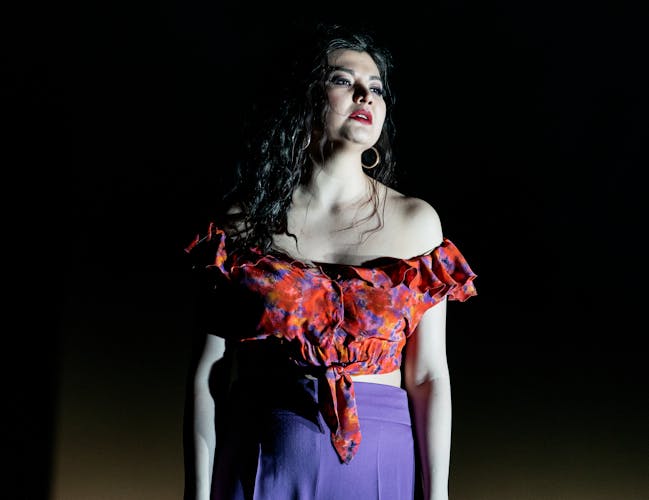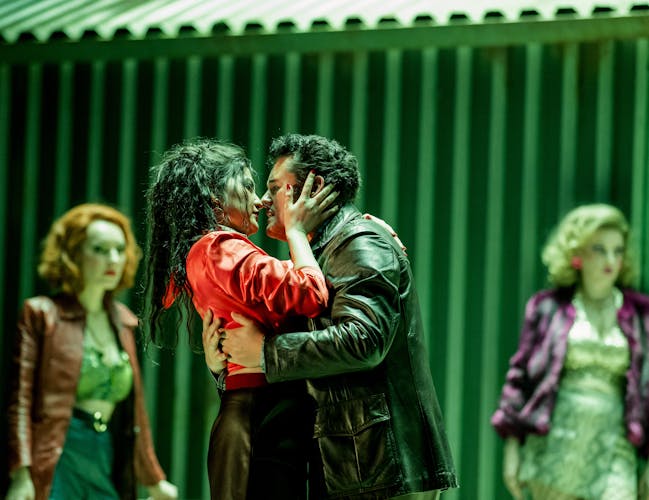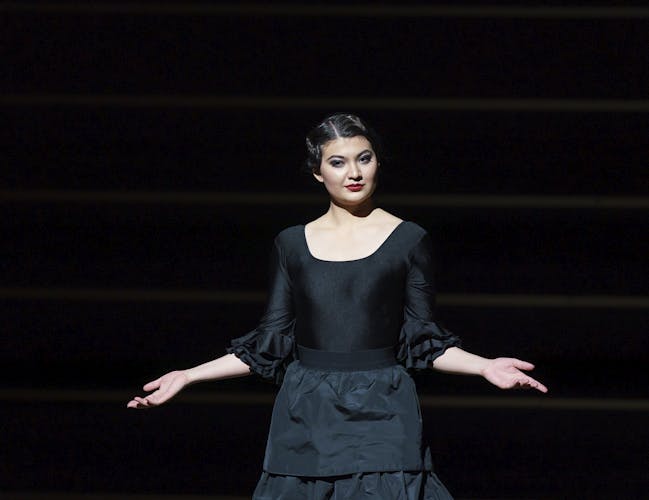Opera Essentials: Carmen
Our quick guide to Georges Bizet’s scorching opera of passion and jealousy.
Under the oppressive heat of the Spanish sun, the restless Carmen takes pleasure in desire. Attracting the attention of Don José, she warns him not to fall in love with her. But José is willing to risk everything for Carmen – and will do so at whatever cost.
Quick Facts
Answering some of the most asked questions about Carmen.
How long is Carmen?
Carmen lasts approximately three hours, including one interval.
Who wrote Carmen?
Carmen was written by French composer Georges Bizet and is based on Prosper Mérimée’s 1845 novella of the same name.
What is the plot of Carmen?
Carmen follows a free-spirited and independent woman and her passionate and destructive love affair with the rule-abiding Don José.
Where is Carmen set?
Carmen is set in Seville, Spain, during the early 19th century. The opera’s vibrant scenes take place in various locations around the city, with the intense atmosphere – especially the heat – reflecting the passionate nature of the characters.
What is the most famous piece from Carmen?
Carmen is famous for its vibrant melodies, including the fiery Habanera – or, ‘L'amour est un oiseau rebelle’ – which Carmen sings in Act I, about the uncontrollable and unpredictable nature of love, and the endlessly hummable Toreador Song, which Escamillo sings in Act II, as he boasts about the thrill of bullfighting.
Kostas Smoriginas performs the Toreador Song from Barrie Kosky's production of Carmen.
History
Georges Bizet (1838–1875) was a French composer who showed remarkable talent from a young age. He entered the Paris Conservatoire at just nine years old and quickly gained recognition for his musical abilities. Before Carmen, Bizet composed several operas, though many were either unfinished or unsuccessful. Some of his earlier works include Les pêcheurs de perles (1863) and La jolie fille de Perth (1867).
In the early 1870s, Bizet was commissioned by the Paris Opéra-Comique, a theatre known for producing light, family-friendly works. Management hoped Bizet would compose something in the same vein, however, Bizet, seeking a bold and dramatic subject, chose to adapt Prosper Mérimée’s 1845 novella Carmen: a dark tale of love, obsession and murder. This decision was controversial, as the Opéra-Comique typically staged works with moral and uplifting themes, and Carmen featured a strong-willed, rebellious heroine, and a tragic ending.
Composition
For the libretto, Bizet enlisted Henri Meilhac and Ludovic Halévy. Known for their collaborations with Jacques Offenbach, who composed many comic operas, the pair’s background in light-hearted operas helped make the dramatic Carmen more (though not completely!) palatable to audiences. Some of the changes Meilhac and Halévy incorporated were the softening of Don José’s character (in Mérimée’s novella, José is a ruthless criminal from the start; the opera turns his downfall more tragic), the introduction of the character of Micaëla, who serves as a moral foil to Carmen, and the development of Escamillo’s character who, in the novella, is more minor.
Although Bizet never visited Spain, he worked to infuse the opera with authentic Spanish musical elements. He studied Spanish folk music and incorporated dance rhythms like the Habanera (a Cuban-Spanish dance) and Seguidilla into the score, while also using vibrant orchestration to evoke a sense of Spanish atmosphere. Despite this effort, much of the music is still distinctly French, blending Spanish colour with Bizet’s own rich, lyrical style.
In addition to the Habanera and Toreador Song, both of which have cemented Carmen’s mainstream recognition, the opera’s Flower Song, or ‘La fleur que tu m'avais jetée’ (The flower that you threw to me), has particular popular appeal. Sung in Act II by Don José, the aria sees José passionately declaring his love for Carmen: the gentle, soaring melody contrasts with José’s growing desperation at Carmen’s disinterest, making it one of the most romantic yet tragic moments in the opera – and foreshadowing the dark tragedy to come.
Jonas Kaufmann (Don José) sings the Flower Song 'La fleur que tu m'avais jetée' with Anna Caterina Antonacci (Carmen) in Act II of Francesca Zambello's production of Georges Bizet's opera Carmen at The Royal Opera, in 2006.
Reception
Carmen had its premiere on 3 March 1875 at the Opéra-Comique. Audiences were shocked by its realistic characters, risqué themes and tragic ending. The murder of the heroine on stage was particularly scandalous, and critics dismissed the opera as immoral and unfit for family audiences. The singers – especially Célestine Galli-Marié (the first Carmen), who scandalised spectators with what one critic called ‘gestures that ooze vice’ – struggled with its demanding music, while the conductor failed to breathe life into the score.
On the poor reception to Carmen, professor Alexandra Wilson writes: Friends who witnessed the premiere, including the composers Massenet and Saint-Saëns, did their best to raise Bizet’s spirits but the critical reaction, when it came over the coming days, was damning. American musicologist Susan McClary’s Cambridge handbook to Carmen exposes the misogyny that coloured the first reviews. The critic for Le Siècle could barely contain his outrage, spluttering about ‘females vomited from Hell’ and ‘provocative hip-swinging’, which he could only make sense of by reference to mental illness, while Le Patrie’s reviewer called Carmen a ‘savage’ and ‘the veritable prostitute of the gutter and the crossroads’.
In an attempt to revive public interest following the disastrous premiere, Bizet agreed to small amendments to his score, including the inclusion of additional spoken dialogue. Tragically, he died of a heart attack on 3 June 1875, just three months after the premiere, at the age of 36. He never lived to see Carmen become one of the most celebrated operas of all time. Shortly after Bizet’s death, Carmen was staged in Vienna, where it received a much warmer response. Over time, audiences came to appreciate its bold realism, unforgettable melodies and emotional depth, and today, its music – and its themes – are appreciated worldwide.
Gallery
Aigul Akhmetshina, one of the world’s most in-demand Carmens who returns to the role in The Royal Opera’s 2024/25 Season, says: I think Carmen is incredibly relevant, even in our times. The world still isn’t truly ready for a woman like her. Even in the twenty-first century, we are surrounded by expectations of what a woman should be – a good wife, a devoted mother, someone who follows the rules. Carmen breaks all of these norms. Women admire her strength, her sensuality, the way she carries herself with such confidence. Many dream of having that kind of power over their own lives. But at the same time, she irritates people, because she challenges everything we are taught about how a woman should behave. What makes Carmen so timeless is that she isn’t just a symbol – she is real. She is flawed, reckless, and vulnerable in her own way. She doesn’t pretend to be anything she’s not. And whether we love her, hate her, or fear her, we cannot ignore her. That’s what makes her unforgettable.
In popular culture
Perhaps more than any other opera, Carmen has had a massive influence on popular culture, with its music and characters appearing in countless films, TV shows, cartoons, commercials and adaptations. Indeed the opera has inspired films including A Burlesque on Carmen (1915), a comedic reimagining by Charlie Chaplin; Carmen Jones (1954), a modernised, African-American adaptation with music by Bizet and lyrics by Oscar Hammerstein, starring Dorothy Dandridge and Harry Belafonte; Carmen: A Hip Hopera (2001) starring Beyoncé; and more recently, Carmen (2022), directed by French choreographer Benjamin Millepied and starring Melissa Barrera (Scream) and Paul Mescal (Aftersun, Gladiator II). The music of Carmen, in particular the Habanera and Toreador Song, has appeared everywhere from The Looney Tunes, The Muppets and Sesame Street to The Simpsons, Doctor Who and F1 racing.
Characters
Carmen – A fiery and seductive woman. She is independent, passionate and unafraid to push the boundaries of tradition. (Sung by a mezzo-soprano)
Don José – A rule-abiding police officer who falls for Carmen, abandoning his duty – and going against the wishes of his mother and of Micaëla – for her. His obsession ultimately leads to violent tragedy. (Sung by a tenor)
Escamillo – A confident and charismatic toreador (bullfighter) who becomes Carmen’s new love interest, rivalling Don José. (Sung by a bass-baritone)
Micaëla – A young woman who loves Don José and respects tradition. She represents José’s past, stable life before meeting Carmen. (Sung by a soprano)
synopsis
In a remote Spanish town, the free-spirited Carmen declares that any man she loves should beware. But even she is unprepared for what happens when she decides to seduce police officer Don José. Though initially uninterested in Carmen’s charms, Don José – against the wishes of his mother and of Micaëla, the woman who loves him – soon abandons his respectable career for a life of danger with Carmen, joining her and her smuggler friends as they outrun the law. But Carmen quickly wearies of Don José's possessiveness, longing to return to her life of independence. When she turns her attention to the celebrated toreador Escamillo, Don José’s jealousy and despair threaten to violently erupt.
ACT I: THE SQUARE OF A SMALL TOWN
Men and women are relaxing in the midday sun. The factory women come out into the fresh air for their afternoon break. Among them is Carmen, an independent young woman who sings a song about love. She throws a flower to Don José, a young policeman who is immediately drawn to her. José is distracted by the arrival of Micaëla, a young woman who brings a message from his distant mother. Micaëla departs, and a quarrel erupts among the factory women. In the fray, Carmen slashes the face of one of her co-workers and is arrested. Alone with Don José, she seduces him and persuades him to set her free. Don José’s superior, Zuniga, reprimands him for letting the prisoner get away.
ACT II: ABOUT A MONTH LATER IN A NIGHTCLUB
Carmen is waiting for the return of Don José, who has been imprisoned for helping her escape. The nightclub is the secret meeting place of a group of weapons smugglers known to Carmen. They want her and her friends, Mercédès and Frasquita, to help them on a job that evening, but Carmen refuses: José has been released from prison, and she knows that he will come to her that evening. The famous bullfighter Escamillo pays a visit to the nightclub and describes the excitement of his sport, and being in the arena. Carmen and Escamillo feel an immediate attraction to one another and share a f lirtatious exchange. Carmen gets the smugglers to leave when she hears José approaching. Their romantic reunion is interrupted by the call for soldiers to return to barracks. When José begins to leave, Carmen mocks him. He declares his love for her, explaining how he cherished the flower from their first meeting during his time in prison. Zuniga arrives, looking for Carmen. In a jealous rage, José attacks his commander. The smugglers break up the fight and bundle off Zuniga as their hostage. José realises he cannot return to the army. He has no choice but to join Carmen and the smugglers.
ACT III: TWO WEEKS LATER
The smugglers are operating from their hideout in the mountains. Don José and Carmen are quarrelling. Her love for him is fading, and she advises him to go and live with his mother. Carmen and her friends begin a series of tarot card readings. Frasquita and Mercédès see a future filled with love and money. Carmen’s cards spell death. Micaëla has followed José to the smugglers’ hideout. She hides when José challenges an intruder, who turns out to be Escamillo, seeking Carmen. The two men fight and are separated by the smugglers. As Escamillo departs, he invites Carmen to his next bullfight. Micaëla emerges from her hiding place with a message to Don José from his mother: the old lady is dying, and she is desperate for him to return home. He agrees to leave, warning Carmen that they will see each other again.
ACT IV: A FEW DAYS LATER
Accompanied by Carmen, Escamillo prepares for his bullfight while a noisy crowd cheers him outside. Carmen’s friends warn her that Don José is lurking nearby. Unafraid, she waits for him and informs him that their affair is over. He begs her to return to him, but she refuses and asserts her freedom. José kills her.
Watch now
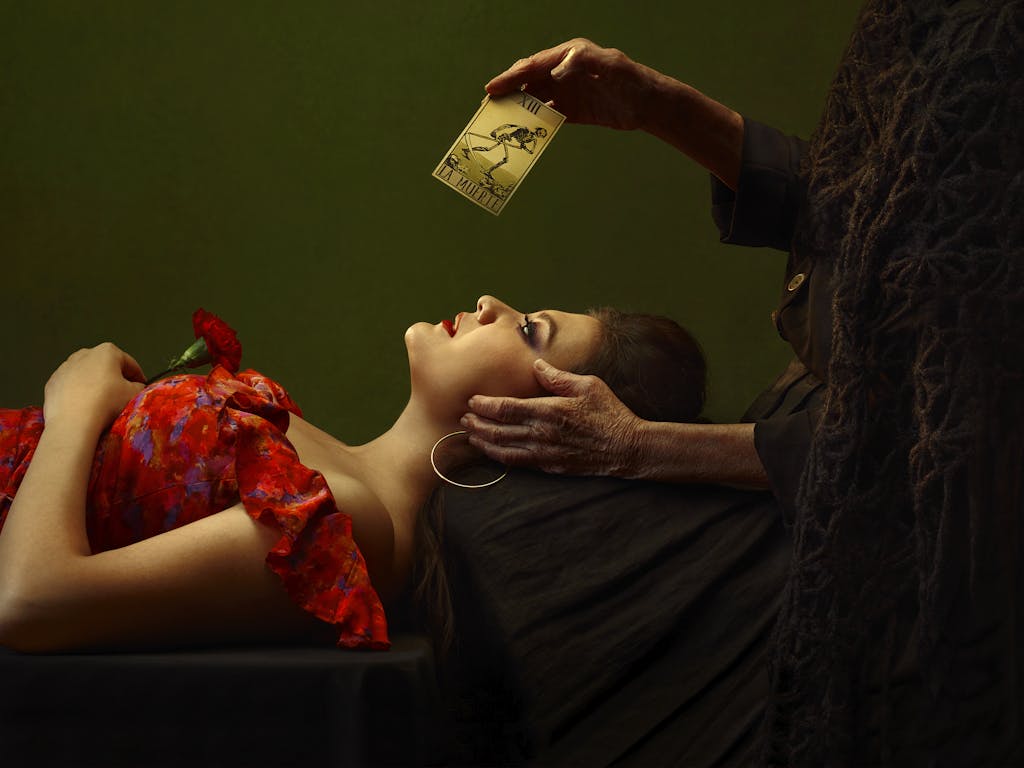
Watch on stage
The untamable heroine of Bizet’s ever-popular opera returns in Damiano Michieletto's searing production of Carmen.
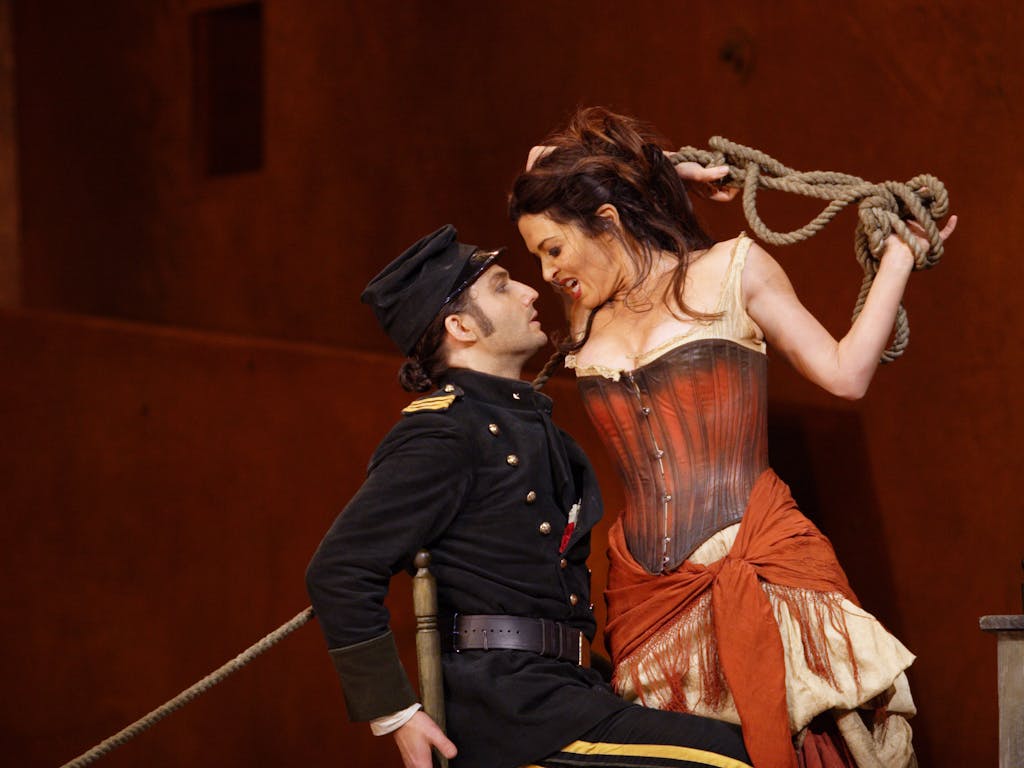
Watch on Stream
Carmen (2006): Director Francesca Zambello joins forces with Antonio Pappano, who conducts the ‘utterly compelling’ Anna Caterina Antonacci as Carmen and Jonas Kaufmann as Don José.
Royal Opera House Covent Garden Foundation, a charitable company limited by guarantee incorporated in England and Wales (Company number 480523) Charity Registered (Number 211775)

